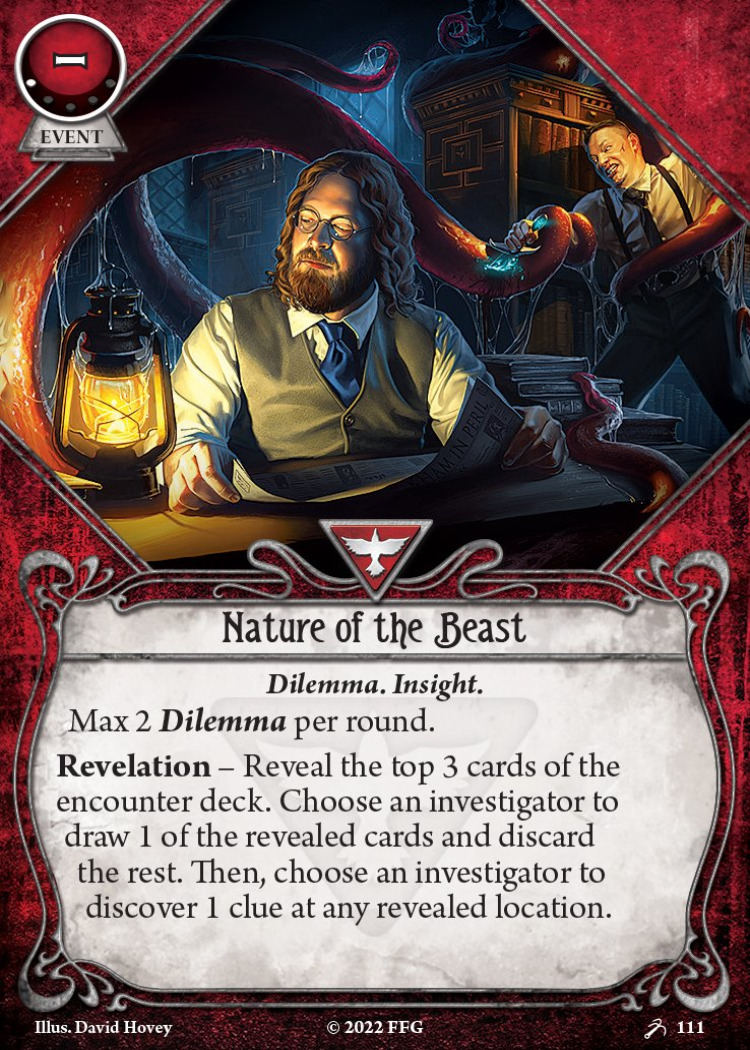- Q: I have a question regarding weaknesses and Dilemma cards with Revelation abilities: If due to card effects (e.g. Deep Knowledge), both Amnesia card and At a Crossroads are drawn, is it possible to freely choose their resolution order? If so, and I choose to resolve Amnesia first, can I choose to discard the At a Crossroads I just drew? If I choose to resolve At a Crossroads first, choose myself to immediately get an action and then randomly discard 1 card from my hand, could Amnesia be randomly discarded due to this effect? The reason I'm having a problem with this is because I don't understand where At a Crossroads is when I'm resolving Amnesia? Is it in my hand or in "Limbo"? A: Good questions. We are ruling that the Revelation ability on a Weakness (or encounter) card must be resolved before the Revelation ability on a Dilemma card. We don’t believe this is explicitly stated, but we would like to include that in the next FAQ update. And yes, if you resolved the ability on Amnesia first, it would be possible to discard At a Crossroads, since it’s a card that’s in your hand at the time. At a Crossroads isn’t in limbo until you’re resolving its ability.
Подія
Dilemma. Insight.
Cost: –. XP: 1.
Max 2 Dilemma per round.
Revelation - Reveal the top 3 cards of the encounter deck. Choose an investigator to draw 1 of the revealed cards and discard the rest. Then, choose an investigator to discover 1 clue at any revealed location.

FAQs
(from the official FAQ or responses to the official rules question form)Reviews
I'm not going to comment on the viability of the card too much, (other then to say that in 4 player especially 1 clue isn't really that significant because you're at best removing one of 4 clues from a location which isn't that high impact) but I've seen a couple comments saying that this card lets you filter the encounter deck. This isn't really true. Sure, if you draw a problematic encounter then you can bin it and not have to worry about one copy of it for the encounter shuffle. But you're also fairly likely to not find any particularly bad encounters and end up removing two of them that would have been relatively easy for your team to deal with and cause you to draw the harder ones sooner. You're not actually filtering your draws, because these are cards that you wouldn't have drawn anyway. It's similar to how discarding cards from your deck doesn't substantially effect your draws aside from having to take a horror from the reshuffle earlier as it means that cards you would have drawn in the middle of the scenario are drawn earlier, and later on in the scenario you'll be drawing cards you otherwise wouldn't have if you didn't discard the cards.
In the end, you're about as likely to discard difficult encounters as you are to cause your team to draw them earlier and more often. Not saying the card is bad or anything, just that "improving your encounter draws" isn't a thing this card really does as it is about as likely to make them worse.
For large group, Nature of the Beast is good card. This card is compared to Drawn to the Flame in that it make the investigator a encounter card. Only 1 clue is discovered, but at any location by any investigator. This card provides remote discover tool. This card gives the fighter a clue to avoid clue spending encounter like Hunting Shadow. In addition, 3 encounter cards are given and 1 is resolved and the others are discarded. It means that discarded encounters are not drawn in this encounter cycle. In addition, chosen card is drawn by any investigator. For 3 or 4 player game, commonly 1 of 3 is easy to handle by one of the player.
When I used, I confront two annoying situations. The first is when the number of the encounter deck is less than 3. I had to choose two of one, or choose one of one. The other is when no clue exists at any revealed location. Then, I had to draw encounter card without advantage.
For small (1/2) group, this card is good with another meaning. Many users comments in this review, so check those if you're interested :)
Great card for Parallel Roland to sidestep Red Tape’s Regulation, as Dilemma cards are not played and, thus, do not count towards its two-card limit:
Dilemmas and Revelation Abilities
Some player cards in this expansion (namely those with the Dilemma trait) possess revelation abilities. As with revelation abilities on other cardtypes, these abilities resolve when the card is drawn or otherwise enters your hand, not when the card is played.
- These cards have no cost ("-"). These cards cannot be played; their effects only resolve when they are drawn or added to your hand.
(…)
Oh, and if there is a discoverable clue at any location (since Nature of the Beast makes an investigator you choose discover one anywhere), it also satisfies both Seek the Truth’s Regulation (if there are any clues at your location — otherwise, the point is irrelevant) and (if there is an enemy at your location). Buying this during upkeep may hinder its effectiveness, but you might still get an additional card draw from the reaction.
Sure, you cannot time it properly since the Revelation effect takes place upon drawing; nevertheless, in the usual flex position Parallel Roland performs, it is not unusual for him to be found in a place littered with clues or around an enemy.